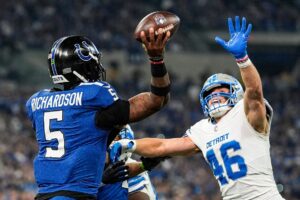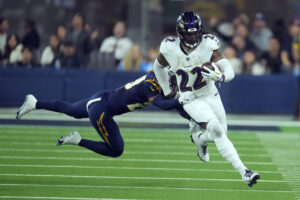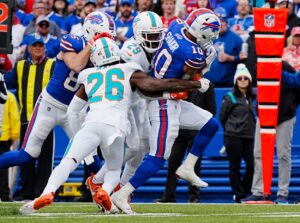To say that the Green Bay Packers season has been a disappointment would be a major understatement. Losing to their biggest division rival, the Minnesota Vikings, this past Sunday was just icing on the cake. By and large, the Packers have failed to live up to expectations this year. It appears that head coach Mike McCarthy is coaching his last games as the Packers head coach. It also appears that his players aren’t buying into his program any longer.
To go along with that, McCarthy isn’t doing himself any favors by his poor game decisions and very questionable time management. Even quarterback Aaron Rodgers, who has been leaned on heavily throughout his career to bail out the Packers, hasn’t been playing up to the high standards he’s set. There’s plenty of blame to go around for the current status of the Packers, but when handing out blame, it should start at the top. The current CEO of the Packers, Mark Murphy, shoulders much of the blame for the team’s failures.
Mark Murphy at Fault for Failure of Green Bay Packers
Murphy took over from Bob Harlan as the Packers team president in 2007. Excluding the messy and well publicized divorce from legendary quarterback Brett Favre in 2008, Murphy took over a team with a solid football foundation. He had Ted Thompson, a well-respected football executive, running the football operations. Thompson had rebuilt the core of the roster after the Mike Sherman era by the time Murphy had taken over. Along with Thompson running the football side, Murphy had the privilege of having Favre as the team’s quarterback for his first season. That year, the Packers went 13-3 and advanced to the NFC Championship game. When Favre departed, the Rodgers era began, leading to further incredible success.
With Thompson in charge of football operations, McCarthy as the head coach, and Rodgers leading the team on the field, the Packers won the 2010 Super Bowl. Mark Murphy was only in his fourth year as the team president when the Packers won that Super Bowl championship. But don’t let that fool you. Murphy didn’t have much to do with that triumph. The foundation was already built when he took over in 2007 and he reaped the awards.
But somewhere down the line, Murphy took his attention away from the most important thing when running an NFL football organization. That being the football side of the team’s operation.
Attention Given to Business, Not Football
From the year the Packers won the Super Bowl until 2016, the Packers had success on the field. Albeit regular season success. During that time, Murphy spent most of his time dealing more so on the business side of the Packers than the football side. Murphy felt comfortable with Thompson and his draft and develop ways running the football side so he spent more time dealing with the business side.
During that time Murphy and his business team worked on Titletown, the name given to the land development surrounding Lambeau Field. Led by Murphy, the Packers worked on ways to squeeze every dime they could out of visiting Packers fans. Titletown brought a new hotel, a brewery, office buildings, and even a winter tubing hill for visiting Packers fans. Murphy and the Packers are now working on developing town homes for the surrounding area of Lambeau Field.
But while Murphy was taking his turn tubing down the hill and acting more like a real estate mogul, the Packers football operations foundation started to crack. This all took place while Murphy was in charge of the organization. This was the start of where the Packers currently sit.
Thompson Loses his Fastball
This past September, Rob Demovsky of ESPN.com wrote a piece discussing the departure of former safety Micah Hyde. The piece discussed the fact that Hyde, a former Thompson draft pick, had departed as a free agent and became a Pro Bowl player for the Buffalo Bills. While allowing one of his Packers draft choices to depart instead of paying him, something that was rare for Thompson, wasn’t the alarming part that came from Demovsky’s piece.
In the article, Demovsky discussed how in the 2017 off-season Thompson was “no longer on top of his game” and that he relied heavily on salary cap and finance guy Russ Ball to make some of the personnel decisions. The alarming part wasn’t that Thompson wasn’t on top of his game, there had been rumors about his health for several seasons leading up to this. The most alarming part of what was reported by Demovsky is that Ball was allowed to make personnel decisions. Not only does Ball have no background in scouting, his job with the Packers was to manage the salary cap and work on players contracts, not make personnel decisions.
During this point in time, not only did the Packers allow Hyde to depart, but also outside linebacker Julius Peppers. Both players went on to have success after departing Green Bay and if Demovsky’s article is accurate, it was Ball’s decision to allow them to walk. This makes many wonder how long Thompson had been without his “fast ball” and how long Ball was making the calls on who would stay and who would depart, and even possibly who was chosen in the NFL draft.
Of course this was all under Mark Murphy’s watch. It gives the appearance that Murphy had fallen asleep at the wheel and wasn’t paying attention to what was going on with the day-to-day operations of the football side of business. This all has played a part in where the Packers currently are.
If it Ain’t Broke
After the Packers failed to make the playoffs in 2017, the Packers front office went through a restructuring. Thompson was removed as general manager and placed in a senior advisory position. That made the position of general manager of the Packers available.
Leading up to the hiring of the new general manager, Murphy stated that the new general manager would have full control of football operations, just like Thompson had when he was running the team. But when Murphy hired Brian Gutekunst as general manager, Murphy threw everyone a big and some would argue an unnecessary curve ball.
When the Packers held a press conference announcing Gutekunst as the general manager, Murphy rolled out a new power structure for the Packers. Instead of McCarthy reporting to Gutekunst, he would report directly to Murphy. The same would be the case for Ball, who was promoted to vice president of football operations. Murphy said that he made this decision because there had been “silos” built in the front office and he wanted to knock them down. If silos were built as Murphy had claimed, they were done under his watch. Something he conveniently forgot to mention in his press conference.
As Tom Silverstein of Packersnews.com recently wrote, Murphy should make another franchise changing decision. That decision is to allow Gutekunst to decide to the fate of McCarthy. As of right now, Gutekunst is more of a vice president of player personnel, not a true general manager. The man most qualified to decide McCarthy’s fate, and possible replacement, is Gutekunst, not Murphy. If the decision was to develop land or build town homes, then Murphy would be your man. But when it comes to football decisions, he should take himself out of the equation.
McCarthy Shouldn’t Be the Only One on the Hot Seat
With how the Packers are playing, and have played the past two seasons, there isn’t much defense of McCarthy. McCarthy has led the Packers for 13 seasons and has done a good job during those seasons. But his expiration date has been hit and it is time to move in another direction. The Packers organization should also look at the other people involved who have led to this point.
While under Murphy’s guidance, the Packers organization has gone from being the organization that many NFL teams try to emulate to now scrambling to try to find answers. During his tenure, the Packers organization has made several crucial errors. From Murphy offering a “bribe” to Favre to stay retired, keeping a general manager in control when he wasn’t fit to do so, allowing a finance manager to make personnel decisions, and finally resurrecting a front office structure that is proven to fail. All of this was either done by Murphy, or occurred under his watch.
If the Packers are truly looking to turn the page and get back to where they once were, they might also make a change at the top. While Murphy has created success on the business side, he has failed to do so on the football side. He has benefited from walking into a great situation and then turning it into a bad one. The time for Mike McCarthy to depart has arrived, but the same could be argued for Mark Murphy as the Packers team president.






